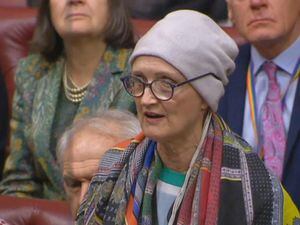Brain tumour cells ‘self-destruct’ when exposed to chemical – study
Glioblastoma is an aggressive form of brain cancer.

A chemical could cause the cells of the aggressive brain cancer which killed Dame Tessa Jowell to “self-destruct”, new research suggests.
The energy supply to tumour cells, taken from patients with glioblastoma multiforme, was shut off when they were exposed to synthetic chemical KHS101, according to the study in journal Science Translational Medicine.
It is hoped the discovery may help tackle the devastating cancer, which only 5% of patients survive for more than five years.
Dame Tessa, a former Labour cabinet minister, died in May at the age of 70. She was diagnosed with a glioblastoma multiforme brain tumour last year.
The research, led by the University of Leeds, examined the effect of KHS101 on human cells in the laboratory.
The chemical was found to disrupt mitochondria, which supply energy to the cells, and the metabolism within tumour cells.
Dr Heiko Wurdak, from the University of Leeds, said: “When we started this research we thought KHS101 might slow down the growth of glioblastoma, but we were surprised to find that the tumour cells basically self-destructed when exposed to it.
“This is the first step in a long process, but our findings pave the way for drug developers to start investigating the uses of this chemical, and we hope that one day it will be helping to extend people’s lives in the clinic.”

The researchers also tested the effect of the chemical on tumour cells transferred from humans into mice.
The growth of tumours in mice treated with KHS101 decreased by around half and normal brain cells were not affected by exposure to the chemical, they found.
Commenting on the findings, Professor Richard Gilbertson, a Cancer Research UK brain tumour expert, said: “Treatment for glioblastoma has remained essentially unchanged for decades, so there is a pressing need for preclinical research like this to identify and characterise potential new drugs.
“While the findings are encouraging, as an experimental chemical, further rigorous testing and refinement of KHS101 is required before trials in people can begin.”





